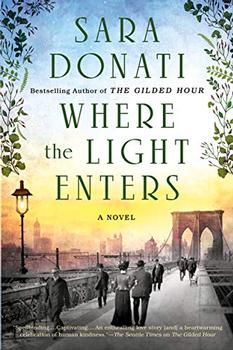Summary | Excerpt | Reading Guide | Discuss | Reviews | Beyond the Book | Readalikes | Genres & Themes | Author Bio

Chapter 1
Later, when people asked about her travels, Sophie would put it simply: the trip to Europe as a bride was hazy in her memory, but she would never forget the voyage home as a widow.
To travel from an alpine village some six thousand feet above sea level to a port on the Mediterranean was not a simple undertaking in winter with so many of the mountain passes closed, but it went without incident: first by sleigh down mountainsides on narrow, winding roads to the river valley, then by rail from Chur to Zürich where she spent the night in the Hotel Widder. On the second morning she traveled by rail to Lucerne, where she took a room at the Schweizerhof Hotel. It was small but elegant, with a comfortable bed in which she found no rest.
When the train left the station early the next day she studied the city, awash in snow flurries, swaddled in low clouds that hid the lake from view and robbed Lucerne of its charms. She could not find any way to feel about the city or the country. She could not feel much at all.
The conductor took her ticket, looked at her papers, and asked about her final destination in a ponderous, old-fashioned English. Finally he inspected Pip with a censorious eye.
"A dog that size won't be any protection for a lady traveling alone."
As was quickly becoming her habit, Sophie decided not to engage in the conversation and so the conductor left her in peace, on her own in a first-class compartment that would seat four passengers. It was terribly wasteful, and still she was pleased with the soft leather of the seats, the blankets and linen pillow provided for her comfort, and the solitude. With Pip on her lap she fell asleep and missed the entire journey along narrow mountain valleys and finally through a new rail tunnel that burrowed under the Saint-Gotthard alps, leaving winter behind. She woke in a sunny landscape lush with spring and awash in color.
Soon there was a new, far more talkative conductor who looked at her papers, named three cousins who had immigrated to New York City to see if she might be acquainted with them, and then launched into a lecture on the Swiss canton of Ticino, all in a stumbling but enthusiastic English: this was the River Ticino running alongside the train tracks, there was the mountain Madone, here the village Biasca, and there—he threw out a hand as elegantly as any stage actor—the house built in 1659 where his own mother was born seventy-two years ago.
In time he went away and left her to wonder about the names of the villages and mountains and rivers, about houses of stone that looked as if they might have been standing there a thousand years. Cap would have dragged her off the train to explore this landscape that seemed not a product of nature, but of a painter's imagination: bright blue lakes bracketed by mountain cliffs rising straight to the sky, palm and cypress trees against stucco painted in the colors of candied almonds: pale green and butter yellow, powder blue and pink. Above it all the glaciers caught up the sunlight to cast it out again.
The conductor came back to tell her that they were about to cross Lake Lugano on a true marvel of modern engineering: a railroad bridge. On the other side was Chiasso and the Italian border.
For the first time in days Sophie realized she was truly hungry. She made her way to the dining car, where a somber waiter put a plate of scraps and a meaty bone down for Pip and brought Sophie one course after another, until she could eat no more. Then she dozed all the way to Genoa. The talkative conductor came once, spirited Pip away to see to his business, and brought him back full of compliments for such a personable, well-behaved animal.
With the help of first the station-master and then a hired carriage, Sophie made her way through Genoa. In the train station she had thought only of a hotel room and privacy, but now the city had her attention.
Excerpted from Where the Light Enters by Sara Donati. All rights reserved. No part of this excerpt may be reproduced or reprinted without permission in writing from the publisher.




The dirtiest book of all is the expurgated book
Click Here to find out who said this, as well as discovering other famous literary quotes!
Your guide toexceptional books
BookBrowse seeks out and recommends the best in contemporary fiction and nonfiction—books that not only engage and entertain but also deepen our understanding of ourselves and the world around us.